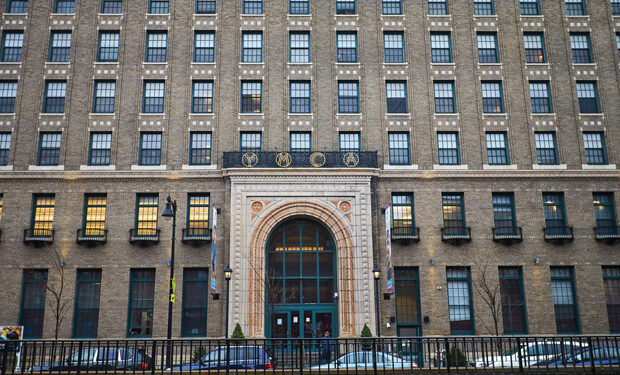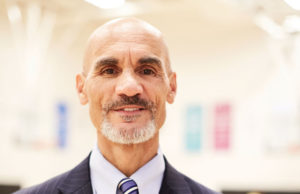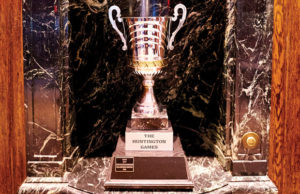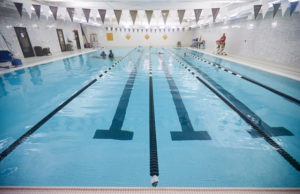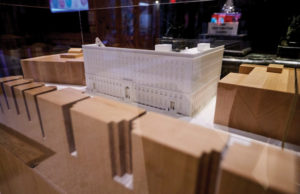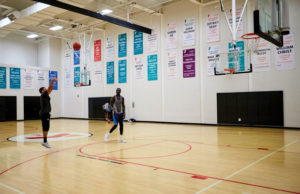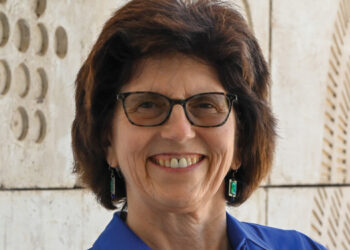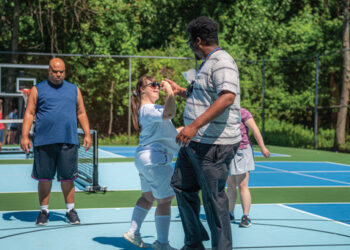Since 1851, the YMCA of Greater Boston has been an epicenter of health, wellness and youth development in its communities.
In 1851, California had only been a state for one year, eggs were two cents apiece, and the newly-founded Boston YMCA was one-of-a-kind. Drawing its inspiration from the first-ever YMCA in London, the Boston YMCA quickly established itself as a pillar of health, wellness and social responsibility in the community.
And the role America’s first YMCA played in the 1850s was similar to — and just as important as — the role it plays today.
“I have a book in my office called ‘The Americans,’ and that book says two of the most important social organizations in America in the 1850s were the YMCA and the Salvation Army,” said James Morton, the president and CEO of the YMCA of Greater Boston. “I think that really says it all — we’ve been a part of this country’s history going back to the 1850s. We are part of what makes America what it is today.”
Today, the Boston YMCA — now known as the YMCA of Greater Boston — boasts 13 locations city-wide. But of the 2,700-plus Ys scattered throughout the U.S., the YMCA of Greater Boston was still the first.
For Morton and his staff, that legacy means a lot. “One-hundred and sixty seven years of making a positive impact on the children, adults and families in the greater Boston community — that’s a huge legacy to sustain,” said Jarrett Royster, the executive vice president of operations. “It means we continue to innovate and remain relevant to our communities.”
And many of the current staff members — residents of Boston themselves — consider it an honor to be associated with America’s first YMCA.
“There’s something special about working at America’s first Y,” said Amy Turner, the vice president of child development. “When I think about Boston and all the rich history here, it means we have a responsibility to our community to continue to be inventive and forward-thinking in our work.”
The pursuit of invention and forward thinking has been a driving force for the YMCA of Greater Boston since its 1851 inception. That legacy, carried out to this day, is driven by the association’s leadership.
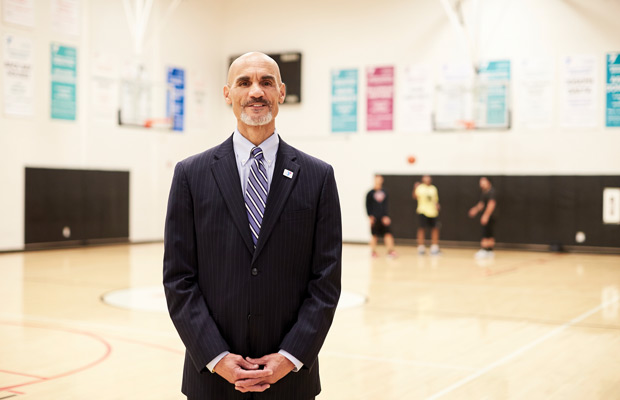
As the YMCA of Greater Boston’s president and CEO, Morton is the association’s key decision-maker and leader. Even in his current position, however, Morton doesn’t think of himself as a seasoned veteran. “I’ve been in this movement a little over 12 years, but for most people in the YMCA movement, I would still be considered a neophyte,” he joked.
Morton has always had a passion for helping his community. Before becoming involved with community recreation, he applied his passion to making an impact in the courtroom.
“I came to Boston in 1978 to attend the Northeastern University School of Law, which is — no exaggeration — two blocks from where I’m sitting right now,” said Morton. “I practiced law for 18 years, then felt I wasn’t changing society in any meaningful way. I went to law school to be an agent of social change, but I wasn’t changing anything as a lawyer.”
During this transition, in which he became a high school history teacher, he was exploring ways to effect change at a more fundamental level: educating and empowering children. This led him to a YMCA in Springfield, Massachusetts.
“I volunteered at the YMCA of Greater Springfield,” recalled Morton. “At the time, I was a teacher at the High School of Commerce, and I had this club at the school called Youth in Government, where my students would pretend they were legislators, lawyers and journalists.”
The program was a unique experience and gave students a taste of how local governments and organizations were run. “Through that pretending, they got to participate with kids all over the commonwealth of Massachusetts and use the chambers that were used by real legislators, and the courtrooms that were used by real lawyers,” recalled Morton.
According to Morton, the greatest benefit of the Youth in Government program was its ability to inspire students to dream bigger than their circumstances and strive for more.
“What has been so significant for me is the power of transformation for young people,” said Morton. “Young people, no matter what their early life experiences might be like, have the potential to become whatever they decide they want to be. I believe that’s the nature of the work we do in the YMCA — we provide people with the opportunity to change the direction of their personal lives.”
After his time at the YMCA of Greater Springfield, Morton was selected as the president and CEO of the YMCA of Greater Hartford in Hartford, Connecticut. And back in April 2015, he transitioned to the role he occupies today: president and CEO of the YMCA of Greater Boston.
What Morton has witnessed in his time in the YMCA has resonated with him for years. “As I talk about this and all these people, I can see their faces — these people who have walked into the YMCA and had the benefit of being a part of it,” he said.
Rising through the ranks as history teacher and YMCA volunteer to president and CEO of America’s first Y, Morton has witnessed firsthand the ability of community recreation centers, like the YMCA, to help teens and their families achieve a greater quality of life.
“I’m talking a lot about transformative change in health and wellness centers, which is happening in YMCAs all over America,” said Morton. “I’m proud to say that’s happening in the YMCAs of Greater Boston. Being able to build new YMCAs and have them become special places in their communities has always been a highlight in my experience.”
According to Morton, there are three distinct qualities that help make the YMCA of Greater Boston a great health and wellness organization for the community: a commitment to serving all people, regardless of their ability to pay or not pay; a commitment to serving active, older adults; and a commitment to serving families.
“At our core, we help and support all individuals and families experience an improved sense of wellbeing,” said Royster. “Adopting a healthy lifestyle is more than just working out. It helps parents to be better parents, and it’s helping families remain together longer, free of disease and illness.”
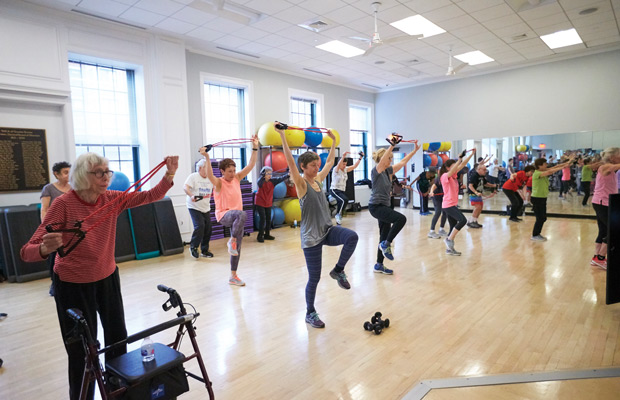
According to Morton, back in the 1850s, the Boston YMCA acted as a wellness support system for men and their families moving into more industrial communities. At its core, that mission is the same, even though the association’s programs and services have evolved with the times.
“This idea of healthy living is a major component of what we do,” said Morton. “I would say a third of our annual budget is comprised of revenue we generate from supporting the health and wellness needs of our families, children and seniors. That enables us to be a very special non-profit organization.”
A focus on total inclusion is also very important to the Y of Greater Boston, according to Morton. “We’re able to make sure everyone gets the opportunity to be a member of the Y, even those who can’t afford it,” he said. “It’s an advancement of our commitment to giving everyone the chance to participate in the health and wellness programs and services across our community — regardless of income levels.”
According to Turner, this is an essential element of what they do. “Inclusion offerings are an integral part of our work,” she said. “We have the ability to have more of a holistic, whole-family approach.”
Among Y of Greater Boston’s health and wellness programs are the traditional offerings: aquatics classes for youth and adults, group exercise classes, and even mind-body programming. Beyond that, however, the YMCA of Greater Boston places an emphasis on inclusive, family-friendly fitness in all its programming.
Chronic disease management programs and the development of adaptive sports programs are a part of the holistic approach that has allowed the YMCA of Greater Boston to set itself apart as a staple of the community, for individuals of all ages and fitness levels.
“We’re that place people go to for exercise and to participate with others in their pursuit of healthy living,” said Morton. “In all our branches, folks are looking to improve the overall quality of their health and their lives.”
In order to truly cater to the needs of everyone in its surrounding communities and help improve their quality of life, the YMCA of Greater Boston offers fitness classes for cancer survivors.
“Our LIVESTRONG program provides [cancer survivors] with a space — in the company of others who have survived cancer — where they can recondition themselves and regain their strength and vitality, and have a greater chance of fully recovering,” explained Morton.
Because he has seen lives changed through LIVESTRONG, it’s a program Morton takes great pride in. “It takes a lot for the body to go through the fight against cancer and survive cancer, so many individuals who survive find themselves in a significantly compromised condition,” said Morton. “So it’s free to the participants — we raise the money needed to make that program available. And the staff who runs it are certified and trained to serve individuals recovering from cancer. It’s an important part of our work.”
The Y of Greater Boston also serves members diagnosed with prediabetes through the Diabetes Prevention Program, a solution based on fitness, nutrition and support.
“We have individuals who are pre-diabetic who come together to support each other, and they’re guided through that experience with a certified and trained instructor who helps them determine what they should and should not be eating, as well as how important movement and exercise is to their health and longevity,” added Morton.
In addition to serving cancer survivors and members with prediabetes, the Y of Greater Boston puts a special focus on serving its senior members.
“There is a fairly large senior population in Boston, so fall prevention, mobility, stretching and strength training programs for our active older adults are the focuses we pay attention to throughout our association,” said Morton.
Through all these programs, the YMCA of Greater Boston has continued the legacy it began back in 1851, acting as a recognizable symbol of health and wellness, and community support all across metropolitan Boston. “Each YMCA becomes the epicenter for health and wellness,” said Morton. “In Boston, we’ve got 13 of those places where people can become part of caring communities.”
And while Morton is at the forefront of the association, the Y’s success truly is a team effort. In fact, it’s one of the characteristics he values most within the organization.
“One of the things I’m proudest of is our ability to build this team and implement what I’m calling ‘collaborative leadership,’ where all the major decisions are not made by me as the CEO,” explained Morton.
Morton values his team so much, he involves each member of his leadership team in important choices. “Most of our major decisions are made as a team,” he said. “By making major decisions as a team, everyone has a voice.”
A recent major decision involved the association’s formulation of strategic initiatives in 2019 and 2020. As per usual, Morton wanted his entire team’s input, and through several meetings, they landed on a clear vision for the organization they wanted to be.
“We’ve got a strategic plan, and we’ve decided the strategic imperatives for our organization are: we want to be an employer of choice, a charity of choice and a partner of choice,” said Morton.
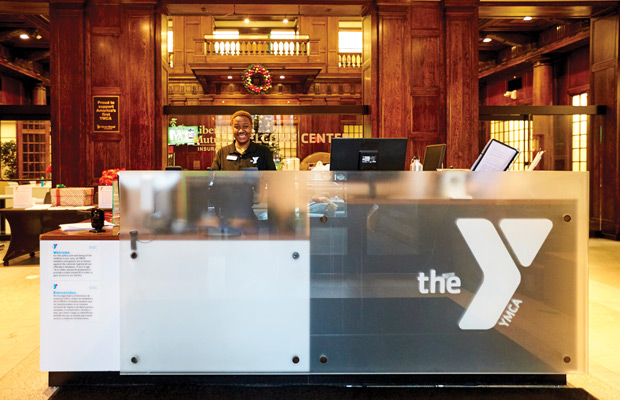
By creating a good work culture and becoming an employer of choice, the Y can hire the best people — and continue building the legacy. “We want to be that place where people want to work, and be part of an organization like ours that has a commitment to positive social change,” said Morton.
As for the second initiative, Morton believes being a charity of choice will allow the YMCA of Greater Boston to further its offerings and ability to meet the wellness needs of its 13 communities.
“We want people to know their charitable donations are being put to the best possible use in service to as many members of our community as possible,” said Morton. “The way we’re able to make sure everyone has access to our memberships, programs and services is through the generosity of our members, donors and corporate sponsors.”
Finally, establishing itself as a partner of choice through professional collaborations is extremely important for the YMCA itself, other organizations and the surrounding communities, as it would help give the Y of Greater Boston more resources to enhance its offerings.
“We want to be that organization everybody wants to partner with and feels comfortable partnering with,” said Morton. “Being a good partner means sharing our resources with others and also utilizing the resources of our partner organizations in creating the best outcomes we can collectively create together.”
Creating reliable partnerships within the community was the key to the Boston YMCA’s success in 1851, and it will be the key to the YMCA of Greater Boston’s success in 2019 and beyond. This is how the legacy will continue to live on.
And to Morton, all these initiatives, programs and services are dedicated to serving the community — which was why the YMCA was founded in the first place. “We’re doing what we do best, and partnering with other organizations and doing what they do best, so what we provide to the community is the best they could hope to have,” he said. “That’s the mission. That’s our future.”


